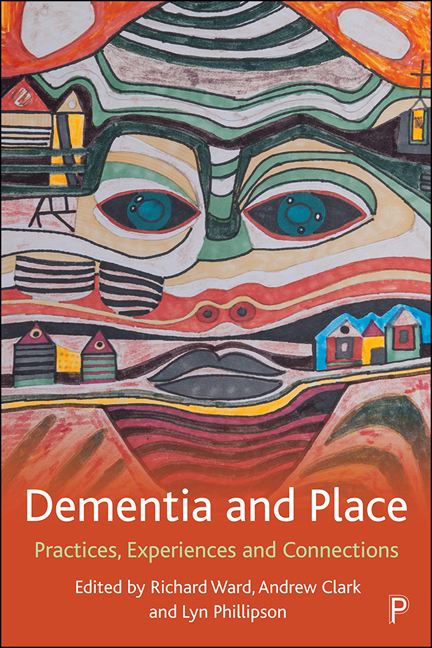Book contents
- Frontmatter
- Dedication
- Contents
- List of figures and tables
- Notes on contributors
- Acknowledgements
- 1 Introduction: Placing dementia
- 2 Understanding the meaning of neighbourhoods for people living with dementia: the value of a relational lens
- 3 Moving house with dementia
- 4 How do people with dementia manage problematic situations in public spaces?
- 5 Making and maintaining neighbourhood connections when living alone with dementia
- 6 My neighbourhood, my future ...?
- 7 Enabling the neighbourhood: a case for rethinking dementia-friendly communities
- 8 A conceptual framework of the person– environment interaction in the neighbourhood among persons living with dementia: a focus on out-of-home mobility
- 9 We’re known as ‘the girls’ around town: support, isolation and belonging for a lesbian couple living with dementia
- 10 Building community capacity for dementia in Canada: new directions in new places
- 11 The good, the challenging and the supportive: mapping life with dementia in the community
- 12 Growing back into community: changes through life with dementia
- 13 Dementia, tourism and leisure: making the visitor economy dementia friendly
- 14 Conclusion: Dementia emplaced
- Index
6 - My neighbourhood, my future ...?
Published online by Cambridge University Press: 13 May 2022
- Frontmatter
- Dedication
- Contents
- List of figures and tables
- Notes on contributors
- Acknowledgements
- 1 Introduction: Placing dementia
- 2 Understanding the meaning of neighbourhoods for people living with dementia: the value of a relational lens
- 3 Moving house with dementia
- 4 How do people with dementia manage problematic situations in public spaces?
- 5 Making and maintaining neighbourhood connections when living alone with dementia
- 6 My neighbourhood, my future ...?
- 7 Enabling the neighbourhood: a case for rethinking dementia-friendly communities
- 8 A conceptual framework of the person– environment interaction in the neighbourhood among persons living with dementia: a focus on out-of-home mobility
- 9 We’re known as ‘the girls’ around town: support, isolation and belonging for a lesbian couple living with dementia
- 10 Building community capacity for dementia in Canada: new directions in new places
- 11 The good, the challenging and the supportive: mapping life with dementia in the community
- 12 Growing back into community: changes through life with dementia
- 13 Dementia, tourism and leisure: making the visitor economy dementia friendly
- 14 Conclusion: Dementia emplaced
- Index
Summary
I was diagnosed with Mixed Dementia, Alzheimer's and Vascular, on 31 July 2014. I may not have much of a short-term memory but that's one date that remains firmly in my ailing brain. At the time I was living happily alone in York and working full time as a non-clinical supervisor in the NHS, teaching Matrons and Sisters how to roster their staff. However, since dementia forced me into retirement I’ve lived alone, still happily, in a small village in the East Riding of Yorkshire. Being alone here during the pandemic could have been a disaster, but instead has become a triumph over loneliness and has shown me the importance of the people in our neighbourhood. Pre COVID-19, I didn't have time to get to know my village, whereas now, COVID has allowed me the space and time in my life to become and feel connected with those around me.
I moved to my village a year after being diagnosed. The hustle and bustle of York, once adored and embraced by me, was now becoming too loud, too confusing. It was important I found somewhere quieter to call home. My daughter had moved to the village with her partner some time back, so I was used to visiting and this influenced my choice to move here. But what struck me was the friendliness of this neighbourhood. I was a stranger yet people smiled and said hello. I felt comfortable here. So, when my thoughts came to moving, the village seemed the obvious choice. I needed to feel safe, to feel part of a community. I needed to feel I could cope here on my own if my daughter and son-in-law moved away. The village felt right.
Prior to our world changing and the word ‘lockdown’ entering our vocabulary, I spent most of the week travelling around the country, raising awareness, sowing seeds of knowledge into people's minds about my experience of dementia. I saw it as a gift from dementia, allowing me to retire early, so my gift in return was carving out a new career almost of public speaking and campaigning against the injustices that exist against those of us living with dementia.
- Type
- Chapter
- Information
- Dementia and PlacePractices, Experiences and Connections, pp. 90 - 93Publisher: Bristol University PressPrint publication year: 2021



